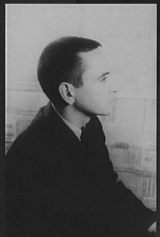
who is best known for The Zoo Story
(1958), The Sandbox (1959), Who's Afraid of Virginia Woolf?
(1962), and a rewrite of the screenplay for the unsuccessful musical version of Capote's Breakfast at Tiffany's
(1966). His works are considered well-crafted, often unsympathetic examinations of the modern condition. His early works reflect a mastery and Americanization of the Theatre of the Absurd
that found its peak in works by European playwrights such as Jean Genet
, Samuel Beckett
, and Eugène Ionesco
.
What I wanted to get at is the value difference between pornographic playing-cards when you're a kid, and pornographic playing-cards when you're older. It's that when you're a kid you use the cards as a substitute for a real experience, and when you're older you use real experience as a substitute for the fantasy.![]()
I have a fine sense of the ridiculous, but no sense of humour.![]()
The gods too are fond of a joke.![]()
You gotta have a swine to show you where the truffles are.![]()
One must let the play happen to one; one must let the mind loose to respond as it will, to receive impressions, to sense rather than know, to gather rather than immediately understand.![]()
I'm not suggesting that the play is without fault; all of my plays are imperfect, I'm rather happy to say — it leaves me something to do.![]()
Good writers define reality; bad ones merely restate it. A good writer turns fact into truth; a bad writer will, more often than not, accomplish the opposite.![]()
A play is fiction — and fiction is fact distilled into truth.![]()
Your source material is the people you know, not those you don't know, [but] every character is an extension of the author's own personality.![]()
What people really want in the theater is fantasy involvement and not reality involvement.![]()

